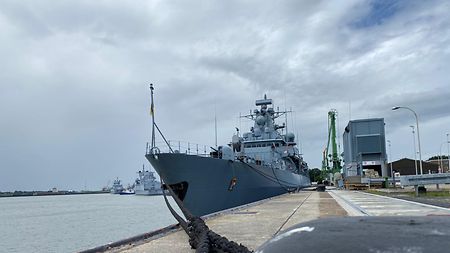German frigate Bayern has set sail for the South China Sea (SCS) amid a geo-political tussle between China and the West. With this, the Indo-Pacific region is swarming with warships from half-a-dozen countries in a calibrated but firm response to Beijing's extensive ownership claims in the SCS.
Significantly, Japanese Defence Minister Nobuo Kishi had in December 2020 spoken with his German counterpart Annegret Kramp-Karrenbauer, inviting her to send a German vessel to the region to participate in joint military exercises with Japanese Self-Defence Forces in 2021.
Japan has been consistently raising the matter of Chinese threat to the region and the world at large.
Es ist gut, über unsere Werte zu reden, noch besser ist es, konkret etwas
dafür zu tun. Heute läuft die Fregatte „Bayern“ in Richtung #Indopazifik
aus – ein Zeichen für Stabilität, Wohlstand und eine regelbasierte,
multilaterale Ordnung. 1/3 pic.twitter.com/zMv6ut2Ww7— A. Kramp-Karrenbauer (@akk) August 2, 2021
Kramp-Karrenbauer visited the port of Wilhelmshaven to see off the frigate on its seven-month voyage to Australia, Japan, South Korea and Vietnam. She said: "We want existing law to be respected, sea routes to be freely navigable, open societies to be protected and trade to follow fair rules", highlighting the very same concerns that have brought the French and also the British navies to the region.
Namrata Hasija, Research Fellow, Centre for China Analysis and Strategy, told India Narrative that this is part of balancing the Chinese presence and growing aggression. "With the Chinese navy consolidating its presence in the Indian Ocean and building a base in Djibouti, as well as foraying into the Mediterranean and Baltic seas, major European powers have been unsettled", Hasija said.
Germany will create a history of sorts as this would be after nearly two decades that its warship would sail through the SCS, most likely in mid-December this year. "The passage of the vessel ties in with the German government's document, Policy Guidelines for the Indo-Pacific region, which was released in September 2020", says Hasija.
A show of force is taking place between European countries led by the US, and China after the latter made the SCS and neighbouring waters a battleground for territorial acquisition. China's claims over Taiwan, as well as in the waters of Vietnam, the Philippines, Japan, and other smaller nations have resulted in skirmishes and a constant bother to the smaller nations.
Last year, one of Canada's warships also passed through the region, upholding the right of passage in the seas around China and held a drill with the Japanese Navy.
A perceived threat from China has resulted in many nations revising their national foreign policies. The Netherlands, Germany and France had done so last year, while the UK did it earlier this year. The UK even made changes to its defence policy, the notable amendment being strengthening its nuclear arsenal.
The US has maintained a uniform policy towards China in the past few years, with the Biden administration largely following his predecessor Donald Trump's China thought on trade, foreign affairs and defence.
Germany has maintained a polite balance in dealing with China, as have many other countries owing to their heavily dependent trade relations with the economic giant. Caught between democratic sensitivities and an aggressive communist party, German warship Bayern plans to support the NATO and EU missions Operation Sea Guardian and Atalanta, respectively. "This development gives more street to the Indo-Pacific strategy", says Hasija.




















